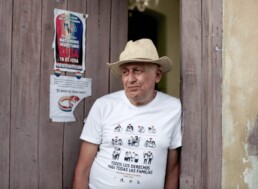'Nomad Solitude' Review: The Reality of Nomadland Living
When Nomadland won the Oscar in 2021, it strongly indicated what audiences wanted to feel from a film. At the height of the pandemic, when people were forced into quarantine, there was an undeniable longing for fresh air, open roads, and above all else, freedom. The days of lockdown may be over but the resounding interest in alternative lifestyles remains high. Director Sebastien Wielemans captures this spirit of minimalist living in the documentary Nomad Solitude.
Life on the Open Road
Nomad Solitude tells the real-life stories of three women who live the lives depicted in big-screen feature films. A couple of examples from recent filmography include characters like Fern (Frances McDormand) in Chloé Zhao's Nomadland and Faye (Dale Dickey) in Max Walker-Silverman's A Love Song. Wielemans documents these women, all in their sixties, who live in their vans and travel wherever the wind takes them. Up and down the beautiful and vast American roads, Laurie, Kristy, and Linda individually give audiences a peek into their lives as nomads. All struggling to make ends meet in traditional society, they find immeasurable joy in their alternative lifestyles.
Linda is a vlogger and runs the YouTube channel Serene and Simple Life. She is a go-getter and monetizes her lifestyle by promoting her Amazon storefront and selling inspirational quote packs. Laurie is very down to Earth, pun intended, and has been solo traveling for many years. She too has a YouTube channel but with only 50ish subscribers, she falls back on family when facing a difficult financial situation. Finally, there is Kristy, a technologically unsavvy nomad who believes the whole purpose of van life is to live in the moment without the burden of having to document every minute of it. All without financial security, these women believe in placing importance on what they believe is a higher currency: freedom.
Camper Vans and Cinéma-Vérité
Filmmaker Sebastien Wielemans travels between Arizona, Tennessee, Florida, Arkansas, Georgia, and Texas in this sweeping portrait of American life. He captures the highs and lows of being addicted to freedom and how that impacts each woman's life differently. He makes an excellent decision to break the fourth wall in the film's third act, which makes the audience feel even closer to the subjects on screen. Further aiding this intimate journey is the score, which masquerades more like windchimes than a traditional soundtrack. The result is serene and heavenly.
Takeaway
A story of resilience and an unsatiated lust for life, Nomad Solitude acknowledges and celebrates uniqueness. If you've ever been curious about life as an "outside person", take a cinematic field trip with Nomad Solitude.
'¡Quba!' Review: For Cuba's LGBTQ Community, Love Wins
The veil of mystery shields much of the world from daily life in the socialist country of Cuba. Director Kim Anno bravely, and successfully, lifts the lid on Cuba's marginalized queer community in the documentary ¡Quba!. Shining a spotlight on the LGBTQ+ people who have struggled for visibility and safety in their communities, ¡Quba! offers a beacon of light and the promise of a more inclusive future. The documentary makes its World Premiere at the 2025 La Havana International Film Festival on Saturday, April 5.
Homosexuality is Not a Danger. Homophobia is.
The vibrancy of Cuba's colorful buildings and vibrant coastline act as a backdrop to this important human rights story. The film takes place around five cities: Havana, Santa Clara, Caibarién, Matanzas, and Santiago de Cuba. They share a similar background where the population's education is low but activism is high. Our protagonist is Adela Hernandez, a trans politician who overcame a four-year stay in prison due to her sexual identity to then become the first transgender official in Cuba's government.
The documentary also interviews Ramon Silverio, a trailblazer who has dedicated his life to El Mejunje Center, often regarded as a cultural haven for the queer community. This safe space aims to challenge prejudice through the universal language of art. Fidel Castro’s niece, Mariela Castro, Las Isabellas, and Ulises Suarez further propel the social revolution by leading the charge on the Marriage Equality Act, which resulted in a victory in 2022.
Love Wins
Combining modern interviews with archival footage from Fidel Castro's reign, ¡Quba! documents just how far the country has come. Gone are the days of machismo patriarchy and religious bigotry. The Cuba of the past is transforming into a country of acceptance and belonging. Says filmmaker Kim Anno, "The Cuban LGBTQ community opened their minds and hearts to our film and I am the first LGBTQ director to make a feature film about this topic."
Takeaway
For most Americans, visiting Cuba for tourist purposes is off the table. Due to a trade embargo and travel restrictions implemented in 1961, U.S. citizens may only enter the country for specific reasons, like visiting family, journalism requirements, or humanitarian projects. Until this ban is lifted, if it ever does, Kim Anno's ¡Quba! is our only window into the Cuban way of life. Thankfully, we have a front-row seat to their LGBTQ revolution.
'Billie' Review: This Queen of Hearts Seeks Revenge
Billie is an operatic revenge thriller that flips the male-dominated poker industry on its head. Writer/director Vincent Bossel's short film artfully puts the control back into the hands of young women everywhere. An exercise in combating ugly and misogynistic stereotypes, Billie is an unapologetic response to the power imbalance that still exists in certain communities and lifestyles.
This Queen of Hearts Seeks Revenge
Set in a Lynchian-style red room with dark furnishings, Billie (Luna Demeules) spends her nights as a masseuse at a private poker club. As the high-rolling men sit around the table smoking, drinking, and carelessly throwing money down in hopes of hitting the jackpot, Billie has her eyes on a different prize. For reasons slightly unclear, although we can assume it has to do with sexual abuse and misogyny, Billie attempts to find one specific man to enact her revenge on. This queen of hearts is on a mission
The Film's Visual Style Hits the Jackpot
Running just shy of 10 minutes, Billie impressively feels like a cornucopia of visual style. From the luscious production design to the dramatic organ piece in the opening sequence, Billie is an inspired crime drama. Award-winning Swiss-Vietnamese filmmaker Vincent Bossel seemingly takes inspiration from Quentin Tarantino and Park Chan-wook in crafting this short. The film's moodiness and fantastical elements play like fever dreams, blurring the lines of reality and fantasy. Bossel also expertly plays with the senses. Bold colors cut drastically between black and white, while walls of sound frequently descend into silence.
Takeaway
A pulsing thrill ride from start to finish, Billie is a deliciously satisfying femme-focused power anthem. The film played at the Rhode Island International Film Festival.
'The Assessment' Review: A Darkly Dystopian Mindf*ck
What immediately piqued my interest in The Assessment wasn't the headlining cast or the Pinterest-worthy production design photos. No, it was the film's director, the French visual artist Fleur Fortuné. Having personally worked in the commercial and music video industry for over a decade, I'd recognize Fortuné's visual style anywhere. She expertly blends surreal and whimsical imagery with compelling narratives, which makes for unforgettable cinematic feats. Fortuné uses her artistic strengths in The Assessment, a dystopian story about a couple's struggle to have a child for reasons other than you'd expect.
Keep Calm and You May Get a Baby
Starring Alicia Vikander, Elizabeth Olsen, and Himesh Patel, The Assessment is a psychologically provocative minefield. Set in the near future where parenthood is strictly controlled, Mia (Olsen) and Aaryan (Patel) are ready to take their relationship to the next level. They want to have a baby. However, the reality of this dream coming true is far more laborious than it once was. In this dystopian landscape, resources are limited and the government has total control over reproduction rights. Despite being a successful couple in every sense of the word, Mia and Aaryan have to undergo a seven-day assessment to determine if they are "fit" enough to have a child.
It doesn't take long before their assessor, Virginia (Vikander), arrives at the couple's home. Without delay, she quickly begins the highly confidential and borderline inhumane process. At first glance, Virginia seems like a levelheaded, unbiased judge of character. Any nerves the couple have are momentarily put at ease. However, Virginia's test quickly unravels into their worst psychological nightmare. Virginia begins acting like a child, roleplaying every worst-case scenario regardless of harmful intent. Mia and Aaryan's relationship begins to crack as they–for the first time–question the very foundations of their society and whether their relationship can survive.
Stunning Production Design Lends Itself to A Swoonworthy Retro-Futuristic Aesthetic
Elizabeth Olsen and Himesh Patel do an excellent job grounding the film in reality while simultaneously pushing against Alicia Vikander's absurdity. Vikander has a lot to play with as Virginia, her performance reminds me of her role in the Mike Mills short film I Am Easy to Find. Vikander is theatrical, brash, and at times borders on annoying. However, her role is to push Mia and Aaryan’s patience threshold. And in doing this, she successfully tests the audience's patience as well.
The retro-futuristic world of The Assessment is beautiful, almost museum-like. Stunning production design by Jan Houllevigue and art design by Philippe Mayanobe bring to life a cohesive blend of fantasy and reality. Further driving the mood is the original score by Emilie Levienaise-Farrouch whose previous work includes All of Us Strangers and Censor).
Takeaway
Filmmaker Fleur Fortuné crafts a darkly humorous and poignant thesis statement in The Assessment. At its core, it requires us to get introspective and determine what we're willing to sacrifice for our heart's desire. It's a chilling film to watch, and even harder to shake.
'Ash' Review: This Hyper-Pop Survival Horror Swings Big
Grammy Award-winning creative Flying Lotus is back with another stylized sci-fi conception in the Eiza González-led thriller, Ash. No stranger to the feature film world (see: 2018's Perfect and 2022's V/H/S/99), Flying Lotus takes on a slightly different approach to the genre by incorporating heavy doses of survival horror. Making its World Premiere at the 2025 SXSW Film Festival, where it was nominated for the Audience Award, Ash lands in theaters this Friday, March 21st.
Amnesia Amidst Aliens Leads to Dire Consequences
Starring Eiza González and Aaron Paul, Ash tells the story of forgotten memory, fragile trust, and the mysterious circumstances aboard a space shuttle stranded on a foreign planet. Riya (González) awakens one morning to find her crew slaughtered, but how they got that way remains a mystery. She has no recollection of that night, and every detail of events prior is fuzzy and unreachable. Stranded and alone, Riya is forced to confront her dire circumstances and impending death sentence. However, it's not long before Brion (Paul) arrives to rescue her. What should be a joyous relief is instead met with hesitation, and an ordeal of psychological and physical terror ensues. Can Riya trust Brion–a stranger–enough to survive?
An Homage to the Video Game Aesthetic
Visually and tonally, the film feels like a hyper-pop montage taken straight out of a video game. From the dialogue delivery to the framing and fight scenes, Ash feels bigger than its indie film budget. The music, composed by Flying Lotus, who also stars in the film in addition to directing, is a blast of high-octane beats and energy. The visual effects stand out as well, especially in the first-person "video game-inspired" combat scenes (complete with flame throwers).
The chemistry between Eiza González and Aaron Paul is accurately intense. They play well off each other's strengths, with Eiza leaning into the seriousness of the dramatics and Aaron's demeanor providing necessary tension relief.
Takeaway
Full of twists and turns ripe for a cinematic psychological thriller, Ash is another genre-bending statement by Flying Lotus. More artful than the traditional narrative feature, Ash is a visual and sonic feast for the eyes and ears.
'Liquor Bank' Review: Surviving the Dark Times With Brotherly Love
Filmmaker Marcellus Cox crafts a poignant story of redemption in the short drama, Liquor Bank. Based on the true story of an ex-Marine who struggles with alcohol dependency, Liquor Bank is a touching portrayal of commitment to betterment and unconditional brotherly love.
Dark Moments Give Way to Strong Survivors
It's morning when Eddie's (Antwone Barnes) phone alarm rings incessantly on his nightstand. Next to the device lay empty beer bottles, presumably from last night's consumption. Eddie lets the alarm go off for longer than it should, as he doesn't seem in a rush to wake up and begin his day. His hesitancy indicates that he is already anxious about what is to come. Soon enough, we understand why Eddie is overwhelmed. Last night would have been his first sobriety anniversary, and yet he missed it to stay home and drink.
As Eddie lingers around his apartment, he is confronted by his sponsor, Baker (Sean Alexander James). Baker lets Eddie know that he is alarmed that he skipped last night's AA group meeting and anniversary party. At first, Eddie is combative, trying to explain the difference between being "drunk" vs "buzzed" but Baker isn't buying it. He shows Eddie some tough love through his concerned yet serious reality check. Baker doesn't sugarcoat the situation. He empathizes with the sentiment that life is hard but reminds Eddie that liquor doesn't make this acceptance any easier. It's a tough message but delivered by a compassionate mentor, which is enough for Eddie to truly have his moment of realization.
Takeaway
Award-winning filmmaker Marcellus Cox is both the writer and director of Liquor Bank. Despite the film's short runtime, Cox delivers a full-bodied narrative layered with emotional density. A dramatic climax gives way to a powerful ending, one that Cox chooses to close on with a quote attributed to Jeff Warner. The passage reads, "We are not put on this Earth for ourselves, but are placed here for each other. If you are there always for others, then in the time of need, someone will be there for you." This message is the backbone of the short film, which will leave audiences inspired and optimistic that change, no matter how difficult, is possible.
'Rule Breakers' Review: One Giant Leap for Womankind
Angel Studios is kicking off International Women’s Day by releasing the inspiring historical drama Rule Breakers. Conventional in its storytelling yet powerful nonetheless, the film is based on the true story of Roya Mahboob, one of Afghanistan's first female IT entrepreneurs. It charts her relentless determination to give young girls the opportunity to study science and break free from the country's oppressive regime. In addition to correlating to Women's History Month, Rule Breakers is releasing ahead of National STEM Week, which kicks off on March 14th.
Some Rules Are Made to Be Broken
Roya Mahboob (Nikohl Boosher) is an iconoclast. As the founder of Afghanistan’s women’s robotics team and a global advocate for women’s education, she lives to inspire others. Despite her country's belief that educating girls is an act of rebellion, Roya continues to defy naysayers and critics by championing STEM in the local school system. She understands the importance of introducing kids, especially young girls, to science. It's no secret that educating the youth is their only way out of the current social oppression.
Despite Roya's good faith attempts to modernize the country, she is continuously met with the harsh reality that not everyone wants women to have autonomy. But this doesn't deter Roya. In fact, quite the opposite. Taking matters into her own hands, she organizes a small robotics team of four high school-aged girls. Together, they create a stunning mine detection robot made from old car parts. Their invention quickly earns them global attention. With all eyes on Afghanistan, Roya finally has her moment to prove to the world why education is not just a choice, but a right.
Takeaway
Rule Breakers is a classic underdog story with a happy ending. Academy Award-winning director Bill Guttentag (Soundtrack for a Revolution) tells this inspirational drama with heartwarming conviction, despite its formulaic, paint-by-numbers Hollywood structure. While there is nothing inherently wrong with this execution, it does feel too conventional and safe, especially for a story about a woman known for pushing the boundaries. However, giving Roya Mahboob and Afghanistan's first robotics team a platform to share their story is a film worth watching and supporting.
'Mesopotamia, TX' Review: Capturing a Phenomenon Up Close
Filmed during a real solar eclipse (and on 16mm film no less), Mesopotamia, TX is an incredible achievement. Written and directed by Lucy Gamades, this short film stands as both an enlightening character study and a successful technical achievement. When the climax of a film depends on a real-life event going according to plan, the stakes are dramatically high. Yet any signs of production stress are overshadowed, pun intended, by the beauty of the visuals captured on screen. Mesopotamia, TX recently made its World Premiere at the 2025 Clermont-Ferrand International Short Film Festival.
Statistical Occurrence, or Act of God?
Any time there is a solar eclipse event, it brings out the best in humanity. People from all walks of life gather together to marvel at the miracle in the sky. For a few brisk seconds, we all experience a universal natural wonder. The lead-up to this moment is when we meet a man (Nicky Maindiratta) and a woman (Megan Greener), two strangers who find themselves waiting for the eclipse amid a crowd of eccentric Texans. The nameless characters are total strangers, he is from out of town and she is a local. Their shared interest in the upcoming earthly phenomenon is enough to get them talking. They engage in playful banter until they eventually get into deep conversation. Their debate poses the question of the upcoming eclipse being an act of randomness or Godly intervention, giving each other pause. Just then, the sun begins to disappear behind the moon, and the new friends put their differing beliefs aside to engage in the communal celebration of this worldly wonder.
The visual aesthetic of Mesopotamia, TX is artfully vibrant. From the bright red title design that matches the protagonist's cowboy hat to the country song "In the Shadow of the Valley" that opens the film, Mesopotamia, TX is a thoroughly fun and enjoyable watch. Filmmaker Lucy Gamades crafts a smart script that comes to life in Matthew Marino's beautiful cinematography. The cutaway shots of the environment around the lead actors anchor the film in realism.
Takeaway
As the light dips into darkness, the energy of Mesopotamia, TX is tangibly felt off-screen. It serves as a genuine moment of reflection and appreciation for not just the beauty of the natural world, but the beauty of independent cinema too.








